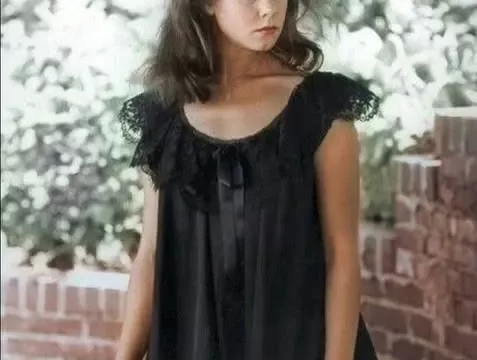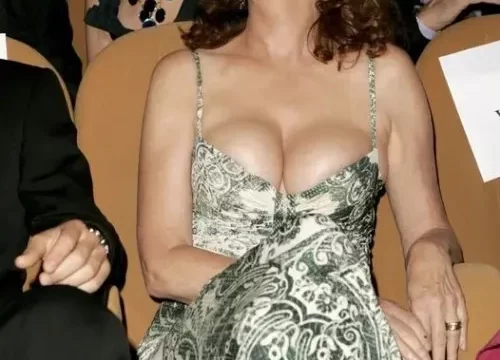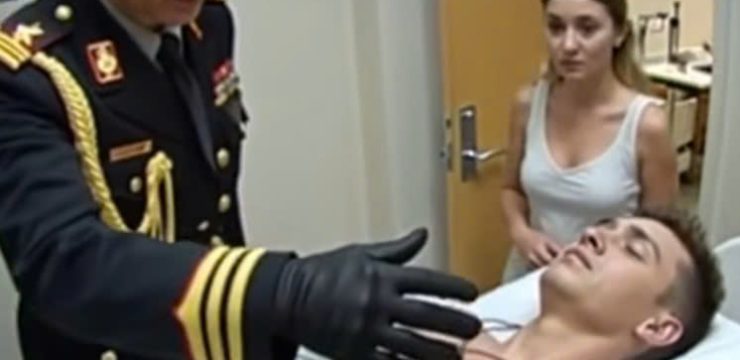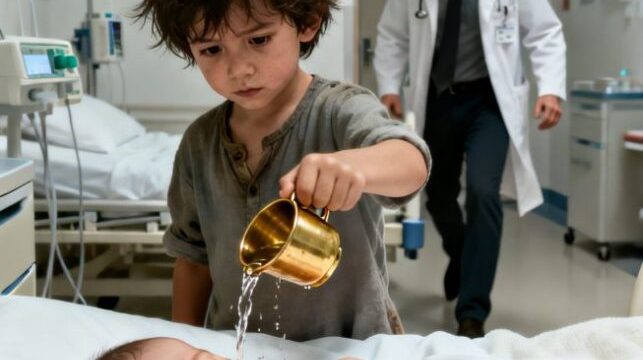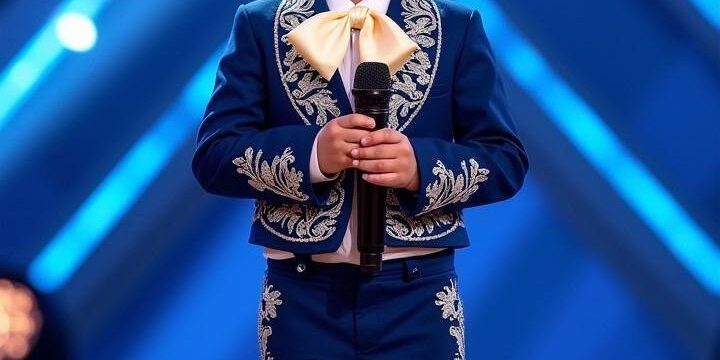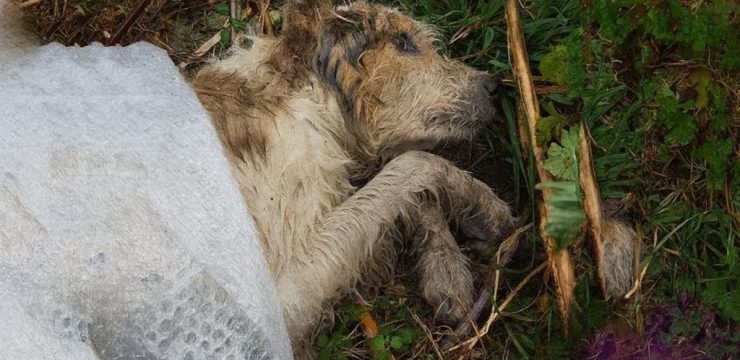It started as an ordinary rescue call on a chilly October morning in Colorado, but what the Wild Heart Rescue team discovered that day would become one of the most extraordinary stories of compassion ever told. A hiker had reported seeing a wounded mustang stallion lying motionless in a remote part of Copper Canyon, about thirty miles outside Denver. He hadn’t moved for more than twelve hours, and buzzards were circling overhead. To most, it sounded like a simple case of an injured wild horse. But when the rescue team arrived, they found something far beyond anything they had imagined.
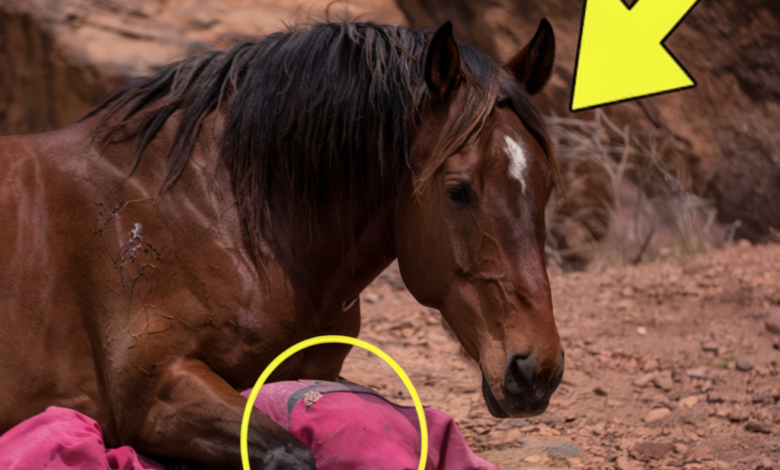
Dr. Elena Rodriguez, the organization’s lead veterinarian, quickly assembled her team. Joining her were Marcus Chen, an experienced horse specialist, and Sarah Williams, a calm and gentle veterinary technician who had a gift for connecting with animals in distress. They loaded their mobile rescue unit and headed into the rugged canyon, a place famous for its wild mustangs—and its dangerous, uneven terrain. Steep cliffs, loose rock, and sudden crevices made it one of the most treacherous places to attempt a rescue.
When they finally located the stallion, Elena gasped. Even in pain, he was magnificent—his mahogany coat glistened under the morning light, his black mane spilling across the rocky ground. Yet something was unusual. The horse wasn’t sprawled helplessly; he was positioned defensively, his massive body curved protectively around something unseen. His dark eyes were alert and watchful, his breathing heavy but steady.
“That’s not how a dying horse behaves,” Marcus murmured, sensing that the stallion’s strength was fueled by something more than instinct.
As they inched closer, the horse snorted sharply, his muscles tensing as if to warn them back. A raven landed nearby, and the stallion let out a fierce, echoing neigh that sent the bird flying. “He’s guarding something,” Sarah whispered. Every few moments, he lowered his head to nudge beneath his chest, releasing soft, almost tender sounds. Elena’s pulse quickened. In over twenty years of animal rescue, she had never seen such behavior.
Moving slowly, Elena spoke to him in a low, soothing voice. “Easy, boy. We’re not here to hurt you.” Her calm tone seemed to earn his brief trust. Then, with a painful effort, the stallion shifted his weight and lifted his torso slightly. What Elena saw beneath him made her freeze in disbelief.
“Oh my God,” she whispered.
There, nestled beneath the stallion’s body, was not another animal—but a human baby. Wrapped tightly in a pink blanket, the infant moved weakly, tiny fists waving in the cold air. The mustang wasn’t defending his territory—he was guarding a child.
For a few seconds, no one spoke. Sarah’s hand flew to her mouth, and Marcus nearly dropped his camera. The realization was overwhelming. Somewhere, someone had to be frantically searching for this baby, yet here, in one of Colorado’s harshest wilderness areas, a wild horse had taken on the role of protector.
Elena immediately ordered Sarah to call 911. Paramedics, sheriff’s deputies, and child protective services would all be needed. While waiting for help, the team worked carefully to assess both the horse and the baby. The stallion was bleeding from a deep wound on his shoulder, likely from a fall or an encounter with a predator. Despite his pain, he refused to move away. His body heat had kept the infant alive through the freezing night, and his vigilance had scared off any danger.
When the rescue helicopter arrived, the noise startled him. He staggered to his feet, spreading his frame to shield the baby from the whipping wind and dust. Even near collapse, he refused to abandon her. Only when Elena reached out gently and lifted the infant did he finally relax, though his dark eyes never left her. The little girl, about six months old, was dehydrated but alive. As paramedics rushed her toward the helicopter, the stallion limped after them, unwilling to let her out of his sight.
At Denver Children’s Hospital, Dr. James Mitchell confirmed the miraculous truth: “That horse may have saved her life.” Investigators soon pieced together what had happened. Tire tracks near the canyon led them to nineteen-year-old Jessica Martinez, the baby’s mother. She confessed that she had fled an abusive relationship and, in panic, left her daughter—whom she named Isabella—in what she thought was a safe hiding place. She had planned to return but never did.
Isabella recovered quickly in the hospital, but one curious detail stood out. She wouldn’t stop crying unless recordings of horse sounds were played. It became clear that she had bonded deeply with her unexpected guardian. Weeks later, child services approved a supervised reunion in Copper Canyon. Under careful watch, Isabella was brought near the stallion, who had since been treated and nicknamed Thunder.
The moment Thunder saw her, he raised his head and released a low, rumbling call that echoed across the canyon. Isabella instantly stopped crying and reached toward him with tiny hands. “This is extraordinary,” said Dr. Mitchell, observing her calm heartbeat and steady breathing. “She recognizes him. Her stress levels are dropping just from hearing his voice.”
For nearly an hour, baby and horse interacted as if no time had passed. Thunder stood completely still while Isabella touched his muzzle, giggling as he gently nuzzled her hair. Separating them proved heartbreaking—both became visibly upset. Moved by their connection, Dr. Elena Rodriguez proposed a unique solution: creating a sanctuary where Thunder could remain free while Isabella could safely visit him as she grew. With the support of donors, state officials, and animal advocates, Copper Canyon was soon transformed into a protected preserve.
Jessica Martinez, having completed counseling and rehabilitation, moved into a small caretaker’s cabin nearby. She worked alongside Elena, helping tend to Thunder and other rescued mustangs. The bond between her daughter and the stallion remained unbroken.
By Isabella’s second birthday, she was thriving—healthy, bright, and unusually gentle around animals. Doctors attributed her emotional strength to the comfort and protection she had received from Thunder during her earliest days. On her birthday, as family and rescuers gathered to celebrate, Isabella toddled through the tall grass, with Thunder grazing nearby. When she wrapped her tiny arms around his leg, he lowered his massive head and brushed his muzzle softly against her cheek.
“Do you think he knows what he did?” Jessica asked quietly. Elena watched the stallion’s eyes—soft, intelligent, full of warmth. “I think he knows exactly,” she said.
What began as a rescue mission ended as a story that redefined the meaning of love, loyalty, and guardianship. Thunder didn’t just save a baby’s life—he bridged the distance between species, reminding the world that compassion has no boundaries. In protecting Isabella, he showed that true heroism doesn’t always roar—it sometimes neighs softly in the dawn.
